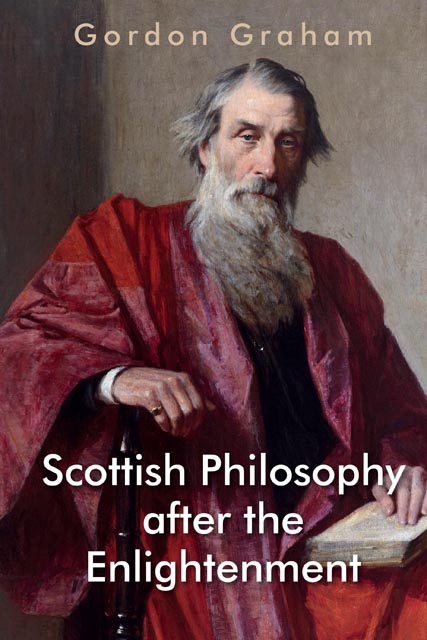Book contents
- Frontmatter
- Contents
- Preface and Acknowledgements
- Series Editor’s Introduction
- A Note on Women in Scottish Philosophy: Mrs Oliphant
- A Chronology of Scottish Philosophy after the Enlightenment
- 1 An Autobiographical Prologue
- 2 Sir William Hamilton and the Revitalisation of Scottish Philosophy
- 3 James Frederick Ferrier and the Course of Scottish Philosophy
- 4 Psychology and Moral Philosophy: Alexander Bain
- 5 Thomas Carlyle and the Philosophy of Rhetoric
- 6 Hegelianism and its Critics
- 7 Scottish Philosophy’s Progress
- 8 Religion, Evolution and Scottish Philosophy
- 9 The Gifford Lectures and the Re-affirmation of Theism: Alexander Campbell Fraser
- 10 The Culmination of Scottish Philosophy: A. S. Pringle-Pattison
- 11 John Macmurray and the Self as Agent
- Bibliography
- Index
4 - Psychology and Moral Philosophy: Alexander Bain
Published online by Cambridge University Press: 07 June 2023
- Frontmatter
- Contents
- Preface and Acknowledgements
- Series Editor’s Introduction
- A Note on Women in Scottish Philosophy: Mrs Oliphant
- A Chronology of Scottish Philosophy after the Enlightenment
- 1 An Autobiographical Prologue
- 2 Sir William Hamilton and the Revitalisation of Scottish Philosophy
- 3 James Frederick Ferrier and the Course of Scottish Philosophy
- 4 Psychology and Moral Philosophy: Alexander Bain
- 5 Thomas Carlyle and the Philosophy of Rhetoric
- 6 Hegelianism and its Critics
- 7 Scottish Philosophy’s Progress
- 8 Religion, Evolution and Scottish Philosophy
- 9 The Gifford Lectures and the Re-affirmation of Theism: Alexander Campbell Fraser
- 10 The Culmination of Scottish Philosophy: A. S. Pringle-Pattison
- 11 John Macmurray and the Self as Agent
- Bibliography
- Index
Summary
I
The question of Hume’s relationship to Scottish philosophy is somewhat problematic. The term ‘Scottish philosophy’, of course, did not gain much currency until 1875, almost a century after Hume’s death, when James McCosh published The Scottish Philosophy. McCosh included Hume in his list of forty-nine Scottish philosophers, giving him the longest chapter in fact, because, interestingly, he thought the content of Hume’s Treatise was not widely enough known. Yet he makes it clear that Hume, to whom he refers as ‘the Scotch sceptic’, is not to be regarded as belonging to ‘the Scottish philosophy’. Rather, ‘it has been the aim of the Scottish school, as modified and developed by Reid, to throw back the scepticism of Hume’ (McCosh 1875: 158). Hume’s role, in other words, is as a stimulus, not a contributor, to ‘the Scottish School’. Ten years later Andrew Seth gave expression to the same idea when he subtitled his Balfour Lectures on Scottish Philosophy ‘A Comparison of the Scottish and German Answers to Hume’. This formulation clearly excludes Hume from the Scottish School, whose principal architect Seth took to be Reid.
Hume’s Treatise preceded Reid’s Inquiry by about twenty-five years, but it is plain that McCosh and Seth did not think of Scottish philosophy as a development that built upon Hume’s Treatise. It was, rather, a reaction to it. This is indeed how, since the late eighteenth century, many people have seen Hume’s relationship to Scottish philosophy, and there is evidently considerable plausibility to the view. Yet there are also important considerations to be brought against it. To begin with, while a key feature characterising Scottish philosophy is the assertion of a radical division between Reid and Hume, that is not how Reid himself regarded matters. Certainly, he and his circle in Aberdeen found Hume’s Treatise a stimulus to their thinking, as Reid expressly acknowledges in a letter to Hume dated 18 March 1763:
Your Friendly Adversaries Drs Campbel & Gerard as well as Dr Gregory return their compliments to you respectfully. A little Philosophical Society here of which all three are members, is much indebted to you for its Entertainment … [Y]ou are brought oftner than any other man, to the bar, accused and defended with great Zeal but without bitterness.
- Type
- Chapter
- Information
- Scottish Philosophy after the Enlightenment , pp. 75 - 94Publisher: Edinburgh University PressPrint publication year: 2022



